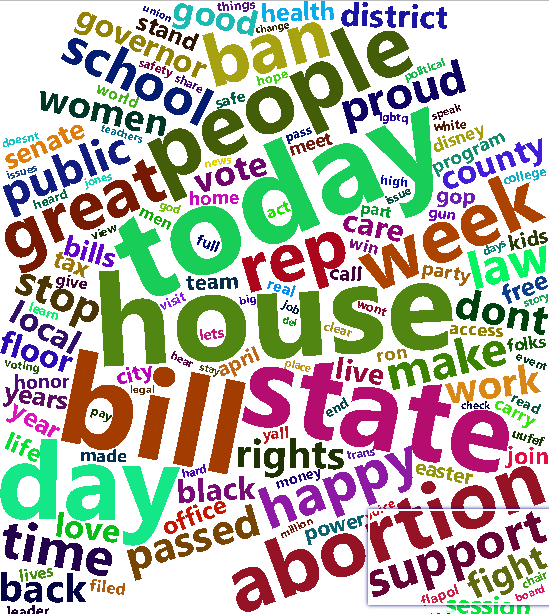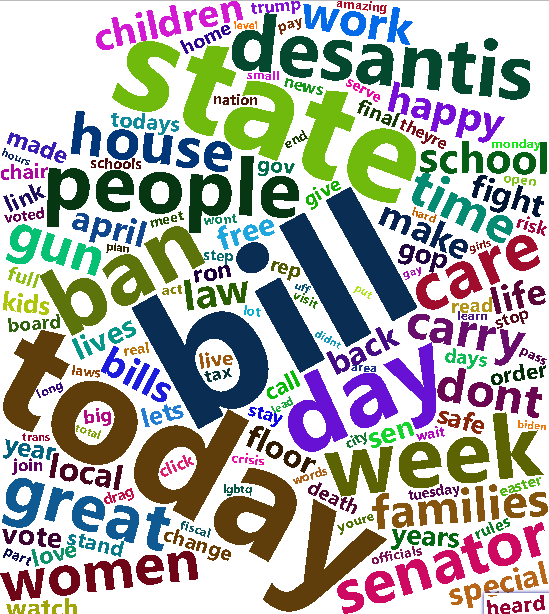Methodology
Given a specified time interval (March 5 – May 7 or Florida Session’ sine die whichever is later) and a list of Twitter handles, the algorithm assigns a tailored weighting to variables including tweets, retweets replies, follower count, following count, and effective reach. The initial ranking was done for a period of the week before Florida’s legislative session started or Feb 26 – March 4.
Unfortunately, the period for rankings ended on April 28 due to changes in Twitter’s API that drastically changed and reduced access to tweets and other data on the platform.
Therefore, final rankings were decided using the period of Feb 27 – April 28, 2023.
Our Twitter algorithm, while recognizing Follower Count and number of new tweets, also attempted to recognize different uses of the platform – to include other activities other than simply broadcasting tweets.
Key Findings
- Representative Anna Eskamani is the Power User of Twitter in the Florida House.
- Senator Shevrin “Shev” Jones is the Power User of Twitter in the Florida Senate.
- Power Users use Twitter differently – Power Users interact not only broadcast.
While the algorithm had to take follower count into consideration and raw number of new tweets, it also indicates a correlation between higher follower counts and different types of tweets.
Members that not only tweeted, but also replied and retweeted others, correlate with higher follower counts. It appears, those that have been able to grow a large audience are interacting with other users, not only posting and using the tool primarily as a broadcast medium.
Members that not only tweeted, but included media (photos, video, and GIFs), correlate with higher follower counts.
Final Ranking
Representative Anna Eskamani (D, FL 52) and Senator Shevrin “Shev” Jones (D, FL 34) are awarded The @ Award recognizing their “Power Use” of Twitter during the 2023 Regular Session of the Florida Legislature.
Both Representative Eskamani and Senator Jones lead the pack in Twitter usage from the beginning, and they never looked back. Other elected officials vied for the 2nd through 10th spots, but Eskamai and Jones were significantly ahead of their peers.
2023 Final House Rankings
| Twitter Name | Ranking |
|---|---|
| @AnnaForFlorida | 1 |
| @micheleforfl | 2 |
| @AngieNixon | 3 |
| @RAlexAndradeFL | 4 |
| @DanDaley | 5 |
| @Gantt4Florida | 6 |
| @SpencerRoachFL | 7 |
| @BernyJacques | 8 |
| @FentriceForFL | 9 |
| @ChipLaMarca | 10 |
2023 Final Senate Rankings
| Twitter Name | Ranking |
|---|---|
| @ShevrinJones | 1 |
| @LeaderBookFL | 2 |
| @loriberman | 3 |
| @LindaStewartFL | 4 |
| @senpizzo | 5 |
| @IleanaGarciaUSA | 6 |
| @debbie_mayfield | 7 |
| @Kathleen4SWFL | 8 |
| @TinaPolsky | 9 |
| @GovGoneWild | 10 |
Content
Content varies with large blocs of “Thanks fellow member x for passing the/my bill through committee/chamber”, holiday greetings, and tweets on the abortion issue.
Below are word clouds of the tweets of House and Senate members.
House Tweet Word Cloud

Senate Tweet Word Cloud

Tagging/Mentions
When elected officials @ someone, they are most likely to @ a fellow Legislator or elected official.
The second most likely entity is a Florida press entity.
A cursory review of the tweet data indicates precious few interactions with constituents.
Hashtags
House and Senate members used Twitter hashtags infrequently during the session. The most frequently used hashtag was “#latergram.”
Most prolific Tweeters
As one would expect, the algorithm rewarded elected officials that tweeted often.
In the House, Representative Eskamai was the top tweeter with 768 total tweets.
In the Senate, Senator Linda Stewart (D, FL 13 – final ranking #4) was the most prolific tweeter with 364 total tweets.
However, Senator Stewart’s relatively lower follower count prevented her from climbing higher in the rankings.
Largest Following
Representative Eskamani shines when it comes to follower count with 90,523 followers.
Senator Jones lead the way in the Senate with a follower count of 35,004.
To put these numbers in context, the highest follower count of any elected official in Florida is Senator Marco Rubio at 4,518,971, followed closely by Governor Ron DeSantis with 4,139,420.
However, Rep. Eskamani has more followers than half of Florida’s Congressional delegation, and Rep. Eskamani and Senator Jones have more followers than a majority of Florida’s statewide elected cabinet members.
Interactivity of Tweets (tweets by type)
Our algorithm rewarded elected officials for interacting on Twitter rather than simply broadcasting. The algorithm assigned weight for Replies and ReTweets.
This is one of the main reasons elected officials with smaller follower counts saw increases in their over ranking.
For example, Senator Linda Stewart (final ranking 4) had a follower count of 3,848; however, 46% of her tweets were replies or retweets. Representative Alex Andrade (final ranking 4) has a follower count of 5,717 however, over 62% of his tweets were replies or retweets.
Media Use
On average, 40% of tweets of the top 10 Power Users in each chamber contained media (photo, video, or animated GIF). Of the tweets that contained media, the vast majority (80%) were photos.
Platform Use
While the algorithm did not use ‘platform’ as ranking criteria, the information was collected.
Over 85% of the tweets sent from the top 10 Power Users were sent using Twitter for iPhone.
The remaining 15% were sent using the Twitter web app and Twitter for iPad.
Few rely on third-party apps like TweetDeck or Hootsuite. However, those not in the top 10 appear to use third-party apps at a higher rate.
While this needs more research, it is our theory, higher usage of third-party apps may be an indication that staff is managing social media accounts rather than the member. We observe an increase in the use of third-party platforms with “official press accounts” of Florida’s Congressional delegation.
Final Thoughts
It is of note tinged with sadness that Twitter is making its API cost prohibitive to researchers.
Without underwriting, it is unlikely that additional studies can be conducted, and we think that is a shame.
